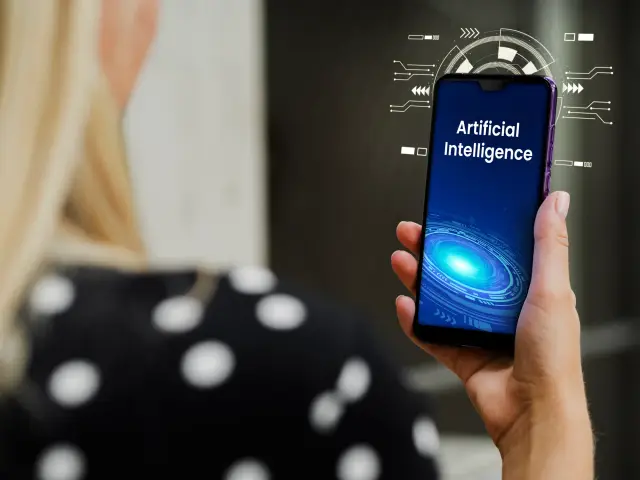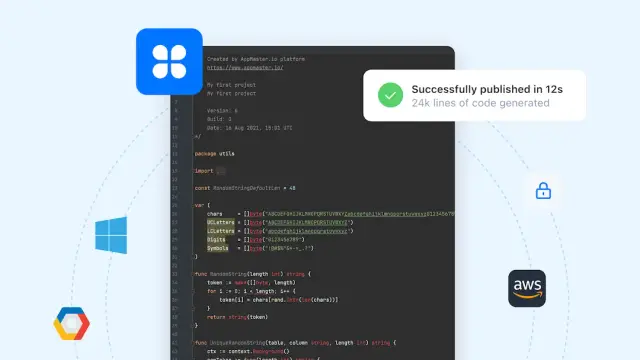From Text to Code: OpenAI's Contribution to Automated App Development
Discover how OpenAI is revolutionizing the automation of app development processes, paving the way for a new era in no-code and low-code platforms. Learn about its benefits, challenges, and the future it holds for businesses.

OpenAI: Transforming App Development with GPT-3
OpenAI, an artificial intelligence research lab focused on developing cutting-edge AI, has made significant strides in app development with its powerful language model, GPT-3. GPT-3 (Generative Pre-trained Transformer) is a language model that uses deep learning to generate human-like text, making it a groundbreaking addition to the app development world.
Integrating OpenAI's GPT-3 into app development platforms has increased automation, resulting in numerous benefits for businesses and software developers. With the help of GPT-3, tasks such as writing code, creating documentation, and performing testing can be accomplished faster and more accurately than ever before. This level of automation reshapes how developers approach their work, effectively streamlining the app development process.
The impact of OpenAI on no-code and low-code app development platforms is particularly significant. These platforms are designed to simplify app development for users without extensive coding experience. Incorporating GPT-3 into no-code and low-code platforms empowers users to build sophisticated applications quickly and easily while minimizing the need for expert developer intervention.
Benefits of OpenAI Integration into No-code and Low-code Platforms
Integrating OpenAI's GPT-3 into no-code and low-code app development platforms offers several advantages that are transforming how businesses and developers approach app creation. Some of the key benefits include:
- Accelerated application development: OpenAI's GPT-3 automates several development tasks, allowing developers to create applications more quickly by minimizing time spent on routine actions. Faster development processes accommodate tight deadlines and fast product launches.
- Reduced human error: By automating the development processes, OpenAI minimizes human errors in coding, testing, and documentation. This results in more reliable and stable applications with fewer defects that need to be resolved.
- Improved collaboration: OpenAI-powered no-code and low-code platforms foster better collaboration between developers, designers, and other stakeholders. Language models like GPT-3 can help bridge communication gaps between different team members with varied expertise, making it easier to maintain a shared understanding of the project requirements and goals.
- Cost efficiency: The automation brought forth by OpenAI integration reduces the reliance on expert programmers, resulting in lower development costs. Businesses can create high-quality applications with fewer resources, making app development more accessible to organizations with limited budgets.
- Democratization of app development: With OpenAI-powered no-code and low-code platforms, app development is no longer the exclusive domain of highly skilled programmers. Individuals with minimal programming experience can now create applications, making app development more inclusive and fostering greater innovation.
OpenAI's integration into no-code and low-code platforms drives a significant shift in the app development ecosystem, enabling businesses and developers to create powerful, feature-rich applications faster and with a higher success rate.

Challenges for Implementing OpenAI-Based App Development
While OpenAI's GPT-3 has had a profound impact on the app development process, certain challenges and considerations must be addressed to fully implement OpenAI-based app development:
- Ensuring the accuracy and relevancy of generated code: While OpenAI's GPT-3 is highly sophisticated, it may not always generate code with the desired accuracy and relevancy. Achieving consistently accurate results depends on training the AI model effectively and providing clear guidance to ensure the generated code meets project requirements.
- Handling complex scenarios: OpenAI's GPT-3 is not without its limitations. There may be instances when the AI model struggles to handle complex requirements or workflows. In such cases, developers may need to intervene manually to refine the generated code, making the development process less automated than initially anticipated.
- Data security and privacy: Proper measures must be taken to maintain data security and privacy throughout the app development process. Integrating OpenAI with no-code and low-code platforms raises potential concerns about handling sensitive information by AI models. Developers and organizations must address these concerns to prevent potential data breaches or privacy issues.
- Accessibility issues: Despite the democratizing potential of OpenAI-powered app development platforms, the technology may still be inaccessible to some users due to high costs or limited availability. The continued development and widespread adoption of OpenAI-based app development platforms should aim to make AI-powered solutions more widely accessible.
By addressing these challenges, businesses and app development platforms can fully realize the potential benefits of OpenAI's GPT-3 and revolutionize the app development sphere.
The Role of OpenAI In AppMaster's No-Code Platform
AppMaster, a leading no-code development platform, is leveraging the potential of OpenAI to further enhance its capabilities and deliver a seamless user experience. The integration of OpenAI into AppMaster's platform has several benefits, making it easier for users to create applications with minimal human intervention. Here are some key ways OpenAI contributes to AppMaster's no-code platform.
Automated Application Development
Incorporating OpenAI into AppMaster allows for automating many development tasks, such as generating code snippets, patterns, and templates. This accelerates the development cycle and enables users with little to no coding experience to create professional-grade applications. The AI-powered features minimize human errors and ensure higher quality and more reliable applications.
Improved Collaboration
As a comprehensive integrated development environment (IDE), AppMaster focuses on creating a collaborative user environment. By integrating OpenAI into its platform, AppMaster fosters improved collaboration between AI and human developers, leading to a more efficient and effective development process.
Accessibility and Inclusivity
AppMaster believes in empowering users with varying skill levels to bring their vision to life with its no-code platform. OpenAI's advanced language model, GPT-3, enables users to create applications quickly using natural language. This reduces the barriers to entry for non-technical users and allows for a more inclusive and accessible development environment.
Streamlined App Customization
Tailoring applications to fit unique business requirements is critical to modern application development. OpenAI's text generation capabilities, when integrated with AppMaster's platform, allow users to easily create highly customizable apps. Users can input their requirements in plain text, and OpenAI can recommend or generate custom code snippets and components that align with those requirements.
Dynamic Updates and Maintenance
AppMaster's approach to application development ensures that whenever there is a change in requirements, new applications are generated from scratch, eliminating technical debt. By incorporating OpenAI into its platform, AppMaster further enhances this feature, enabling dynamic updates and application maintenance while simplifying the process for users.

Real-World Use Cases
Integrating OpenAI's GPT models into automated app development has led to transformative changes across various industries and scenarios. Here's a closer look at how GPT-powered development is making a significant impact:
- Software Development: GPT-powered systems have demonstrated proficiency in generating code snippets and assisting software developers in writing complex algorithms. This streamlining of the coding process accelerates software development cycles.
- Healthcare: In the healthcare industry, GPT-powered development aids in creating applications for medical data analysis, diagnostics, and personalized patient care. Natural language processing capabilities contribute to improving communication between healthcare professionals and AI-driven applications.
- Finance and Fintech: The financial sector benefits from GPT's ability to generate code for algorithmic trading, risk analysis, and fraud detection applications. This ensures the development of financial software that adheres to industry regulations.
- Education: GPT models facilitate the creation of educational apps by generating code for interactive learning platforms, automated assessment tools, and content delivery systems. This supports the development of innovative solutions for the education sector.
- E-commerce: GPT-powered development enhances e-commerce applications by generating code for recommendation systems, personalized shopping experiences, and efficient inventory management. This contributes to creating a seamless and engaging online shopping environment.
- Customer Support and Chatbots: GPT-driven chatbots and virtual assistants are increasingly utilized for customer support in various industries. They can understand and generate code for implementing sophisticated conversational interfaces, improving user interactions.
- Content Generation: Beyond traditional development, GPT's natural language generation capabilities are leveraged to automate content creation for websites, blogs, and marketing materials. This ensures a steady flow of high-quality, context-aware content.
- IoT (Internet of Things): GPT-powered development plays a crucial role in IoT applications by generating code for device communication, data processing, and automation. This accelerates the deployment of IoT solutions in various domains.
- Accessibility Solutions: GPT models contribute to developing applications that enhance accessibility for individuals with disabilities. This includes generating code for adaptive user interfaces and speech recognition features.
GPT-powered development transcends industry boundaries, offering a versatile toolkit for creating innovative applications across diverse sectors. The adaptability of these models positions them as valuable assets in addressing complex challenges and advancing technological solutions.
The Future of OpenAI and Automated App Development
As the app development world evolves rapidly, integrating advanced AI technologies like OpenAI will play an increasingly crucial role. OpenAI's impact on no-code and low-code platforms signals a promising future for the industry. Here are some key trends and predictions for OpenAI and automated app development:
A Continual Advancement of AI Capabilities
AI technologies like OpenAI will continue to advance, offering more powerful and sophisticated solutions for app development. This will enable more efficient and accessible app creation processes, helping businesses adapt faster to emerging market demands and trends.
Enhanced Collaboration between AI and Human Developers
As AI-powered development tools grow more capable and intelligent, we can expect seamless collaboration between AI and human developers, resulting in improved efficiency and more innovative applications. AI and human developers will bring unique strengths to the table, working together to create high-quality, scalable, and user-friendly applications.
Further Democratization of App Development
Integrating OpenAI into no-code and low-code platforms is a significant step toward democratizing app development. By making AI-powered app development solutions more widely accessible, users with varying technical expertise will be empowered to create their own applications, resulting in a more diverse and innovative application environment.
Increased Adoption of AI-Driven No-Code and Low-Code Platforms
The success of OpenAI in automating app development will encourage more businesses to adopt AI-driven no-code and low-code platforms like AppMaster. This will lead to faster development cycles, cost-effective solutions, and a higher level of user satisfaction among both developers and end-users.
The integration of OpenAI into app development platforms like AppMaster's no-code platform signals an exciting future in automated application development. As AI technologies advance, we can expect more innovation, accessibility, and efficiency in the app development process, unlocking new possibilities for businesses and individuals alike.
FAQ
OpenAI is an artificial intelligence research lab synonymous with cutting-edge AI technologies. One of its most advanced solutions is GPT-3, a powerful language model that generates human-like text. OpenAI is transforming app development by automating various processes, paving the way for innovative no-code and low-code software development solutions.
OpenAI integration into no-code and low-code platforms offers numerous benefits, including faster application development, reduced human error, improved collaboration, and cost efficiency. It enables users with little or no coding experience to create professional-grade software solutions.
Challenges in implementing OpenAI-based app development include ensuring the accuracy and relevancy of generated code, handling complex scenarios, keeping data secure and ensuring privacy, and making AI-powered solutions accessible to a broader audience.
AppMaster leverages OpenAI to automate and streamline the application development process, enabling its users to create highly-scalable and enterprise-grade applications quickly and easily. The integration helps to minimize human errors and improve the overall quality of applications developed on AppMaster's no-code platform.
The future of OpenAI and automated app development entails continuous advancements in AI technology, more powerful low-code and no-code solutions, seamless collaboration between AI and human developers, and greater access to AI-powered app development platforms for people with varying skill levels.





